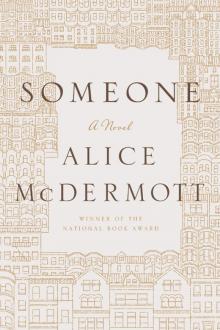- Home
- Alice McDermott
Child of My Heart Page 2
Child of My Heart Read online
Page 2
I don’t know how to account for it, my way with small creatures. Nor did it ever occur to me to try. Because I was a child myself when I began to take care of other children, I saw them from the start as only a part of my realm, and saw my ascendance as a simple matter of hierarchy—I was the oldest (if only by a year or two) among them, and as such, I would naturally be worshipped and glorified. I really thought no more of it than that. And when they clung to me and petted me, when the boys, lovesick, put their heads in my lap and the girls begged to wear my rings or comb my hair, I simply took it as my due. I was Titania among her fairies (the summer I was thirteen I even named the Kaufman kids Cobweb and Peaseblossom, to their unending delight); and the dogs and cats and bunnies and gerbils that seemed to follow their young owners in their affection were only doing what nature, in our little realm, prescribed.
Ironically, it was my way with pets that caused me more trouble with my employers than my way with children— because while on occasion a mother would pretend to be hurt by a child’s insistence on my company if a nightmare woke her from a nap or if a knee was scraped, fathers were genuinely offended by their pets’ changes in loyalty. I remember in particular one young black Lab, Joker was his name, who would not leave my side, not even for a run on the beach with his down-for-the-weekend master, not even when I urged him to go ahead, pushed him to his feet, whispered into his velvet ear. He would only slowly wag his tail at the sound of my voice and then sit down again at my feet—much laughter from the children on the porch or the beach blanket, much consternation from the rejected owner. I gathered from the children the next summer that there had been some advocacy on the father’s part not to have me back.
If there was any trick, any knack, to my success as a minder of children, it was, I suppose, the fact that I was as delighted with my charges as they were with me. Although I had spent my own childhood in what seemed to me a kind of leafy green contentment, I had been alone much of the time, as happens with only children of older, working parents—especially only children of older parents who live in a village filled with summer houses and temporary residents—and the time I spent with my charges was probably the longest stretch of time I had ever spent with anyone other than my parents and myself. As a result, I didn’t have to devise games and entertainments for the children I watched, I had only to include them in the ongoing games and entertainments I had devised for myself long ago.
And then there were the Morans. Except for an elderly couple I saw only when my mother sent me to their house with a jar of beach-plum jelly or a basket of tomatoes from our garden or the extra bluefish my father had caught, the Morans were our only full-time neighbors. In my earliest memories, Mr. Moran lived in his house alone. I have the impression I thought then he was a retired sea captain—maybe my father had made some joke about it that I had misinterpreted (he often referred to Mr. Moran as being “three sheets to the wind”—a nautical-enough reference for a six-year-old), or maybe my Uncle Tommy, my mother’s dissipated younger brother, told me the tale and I believed him (because if I inherited my way with children and animals from anyone, it must have been from Tommy). Or maybe it was just the way Mr. Moran looked—bowlegged and Popeye-thin, with a constant two-day growth of beard. His house was behind and perpendicular to ours, surrounded by a tall hedge that obscured all but the gravel driveway and a bit of his overgrown lawn. I don’t recall seeing much of him then. I’d hear him singing sometimes on the other side of the hedge when I played alone in our back yard—burring, Celtic folk songs that I took to be sea chanties—and I’d sometimes see my father chatting with him over our split-rail fence or at the dock in Three Mile Harbor, where they both kept their boats. On occasion, the town police would pull into Mr. Moran’s driveway—bringing him home, my father would explain, after a “bender”—and twice my parents had to summon the police for him themselves: once when he appeared at our door at dinnertime with his lip gashed open and blood pouring from his mouth; another time when they discovered him out cold on our side lawn, his face in the grass and his pants down around his ankles (too late, they had tried to shield my eyes, but not before I got a quick, bone-chilling glimpse of a mound of a pale adult backside, as gray and lonesome as a sand dune in winter). Not long after this, Sondra, Mr. Moran’s daughter, and her family moved into the ramshackle house.
It was the winter before I took my first mother’s helper job with Mrs. Carew. Sondra was a bleached blonde in those Marilyn Monroe/Jayne Mansfield days when being a bleached blonde made for instant glamour. She wore a black lambskin jacket and had a baby in her arms and three more toddling, towheaded children around her. On that first day, there was no sign of their father. They arrived in a wood-paneled station wagon that for the next week was left parked and unpacked by the side of the road. My mother had seen them all arrive from our kitchen window, and it wasn’t an hour or two later that I stepped out our back door and found the three little ones draped over the wide wooden plank of our tree swing. Although it must have been January or February and the winter chill of the ocean was in the air, only one of them, the girl, wore a jacket and a hat. The two boys were in sweatshirts and pajama bottoms. All three wore socks on their hands but none on their feet, which became abundantly clear when one of the boys (Petey, as it turned out), not ten seconds after I’d said hello to him, leaned too far over the seat of the swing and landed headfirst on an exposed and frozen tree root.
Rivulets of blood running over a pink scalp, running through the stubble of their white-blond hair, will remain for me forever the emblem of the Moran kids.
Nobody ever paid me for minding them, but from that day forward I had only to walk out our back door to find one or more of them suddenly in my care. They’d be slumped against our fence, all four, eventually all five, of them, locked out of their own home by their raging parents, or one or the other would be sitting bereft in our yard, tears streaking dirty cheeks, blood, more often than not, coming from somewhere—a scraped elbow, a scratched mosquito bite. It got so that when I brought one of them inside to wash the cut and the dirty hands and face, I could pretty much name the date and place of every other scar I found on them as well.
Sondra’s husband arrived a week or so later, a vague figure coming and going, sometimes in dark suits, sometimes in jeans, sometimes, I suspect, in the guise of another man altogether. She fought with him, and with her old father, exchanging curses and throwing things and then screeching out of the driveway in her car at any hour of the day or night, the children left in her wake seeming to settle behind her, in the road, on our lawn, across our back steps, like the detritus of some explosion.
Every once in a while the Moran kids would show up with a new pet, sometimes a cat or a dog they had found, a length of clothesline tied around its neck, sometimes a turtle or a salamander or a fledgling bird. These, too, of course, would eventually fall into my care, at least until they ran away or died or were claimed by their real owners. Two of them came and went regularly: Rags, a mangy but sweet little mutt, and Garbage, an orange tabby cat.
The summer Daisy came, I had limited my babysitting duties to Flora, the artist’s child, but had also supplemented my pay with a couple of dog-walking and cat-sitting arrangements with some of the people in the neighborhood. Flora was easy enough. She was two and a half and mostly docile, and my charge was to pick her up every morning and, if the weather was good, push her in her stroller to the beach, give her lunch there, let her take her nap, and then bring her home again at four or five so the housekeeper could bathe her and put her to bed. On rainy days, I would play with her in her room or walk her back to my house, where I would have to keep her, like some delicate china vase, just slightly beyond the full grasp of the Moran kids’ dirty hands. She was tiny for her age, with very little hair, and her mother dressed her always in loose white dresses, like a baby in a painting. Her mother was some kind of dancer or actress. She was thin and tall, with something severe about her face—a sharp nose and high cheekbones and a nar
row mouth, a certain gray roughness to her otherwise flawless skin that would put you in mind of expertly poured concrete. She was a good thirty or forty years younger than Flora’s father, the artist—maybe more. He was an unremarkable old man, glasses, khaki pants, a stoop. He had a long thatch of white hair that seemed to rise over his head like a pure white tongue of smoky fire. I don’t think I ever figured out just where it took root, but it seemed to me that his hair moved constantly, like a flame—perhaps fanned by the constant stirring of his artistic brain. My parents said he was supposed to be a genius. He painted huge abstracts in a garage-sized studio beside the house, and sometimes out on the gravel driveway itself. They weren’t particularly colorful or interesting pictures, but he had done some sketches of Flora and his wife that hung in Flora’s bedroom, and these were good enough to make me believe he actually knew what he was doing.
The first time I babysat for Flora he gave me a bit of his work. It was an evening in the early spring, the April before Daisy came. They had called me at the last minute because their housekeeper had missed her train from the city and they had an affair to attend (or so it was put to me by my mother, who took the phone call) in Southampton. My father dropped me at the door and the cook let me in. I found him sitting at a narrow desk in their long, low living room. He was waiting for his wife and he was drawing, scrawling really, two or three charcoal lines on sketch paper. As soon as he had done one, he threw it on the floor and began another. I introduced myself and he said, still drawing, that the girls would be right out. He sat sideways at the little desk, his long legs crossed, drawing, tossing, drawing again. As I waited (sitting on the edge of what seemed a quite modern and impractical white leather couch), he must have gone through fifty pieces of paper, and from what I could see, the pattern of marks on each one was exactly the same. When Flora toddled into the room, he barely looked up, not even when she stepped on some of his strewn papers. She was in a white nightgown and her thin hair rose straight up like her father’s. A pretty child in her own, odd way. I showed her the magazine I’d been paging through, and without hesitation she leaned against my knees. She was on my lap by the time her mother came in (dressed, as I recall, in something elegant and vaguely Chinese), and as I received my usual instructions about where they would be and what lights should be left on when Flora went to sleep, I noticed that he continued drawing and tossing his drawings on the floor. Then suddenly, without a word to him, his wife leaned down to kiss her daughter’s head, turned her long nose toward the front door, and followed it out. I had a moment when I wondered if he was going along. I even wondered if he was the husband at all and not some visiting grandfather I’d be expected to mind as well. I kept talking to Flora about the pictures in the magazine, keeping her distracted from her mother’s departure but watching him, too, from the corner of my eye. He drew a few more sketches and then, answering to no call, like a man alone in a room, he slowly stood, paused, and then, still standing, leaned over the desk to draw the pattern once more. Flora and I by this time had gone through the magazine and she now had me by the hand and was pulling me toward a basket of books beside her father’s desk. He looked up and saw her and smiled distractedly, and then he looked at me. He took off his glasses. He had that delicate, almost crinkling, thin skin you see in old men. The piece of charcoal was in his hand and had dirtied his fingertips. He gave me a different kind of smile, rolling the charcoal between thumb and forefinger, taking me in. His white hair moved as if caught in a soft breeze. “I hear you’re a babysitter par excellence,” he said—not the way I would say it, but the way someone who really spoke French would say it. I told him I just liked children. He nodded slowly, as if this were a sad but complex piece of information, and then, putting on his glasses, he turned back to his sketch. He signed it with the charcoal and then handed it to me, over Flora’s head. “Take this home and frame it, then,” he said. “It’ll help you put all your own kids through college.” It was unremarkable enough—a loop, a line, a thing like a chicken leg—also vaguely Oriental. The paper was thick and lovely, though. After he left (strolling toward the door as if it were an arbitrary destination, although I could see when he opened it the headlights of the car where she sat, I could hear the impatient idling of the engine), I placed it between the pages of a Life magazine and put it on the table by the front door so I wouldn’t forget it. I thought less of how it would help me to put my kids (all my kids) through college than of what an embarrassment it would be to him if I didn’t bother to take it home. He might well have been a genius, a famous artist, a man whose signature and doodles were valuable, but I was fifteen and pretty and I didn’t doubt for a moment that I was the one with the advantage here.
The next morning, Flora asked for me as soon as she woke up and then cried when she understood that I wasn’t still in the house, and so her indulgent mother called me to ask if I’d like to take Flora for a walk in her stroller, and then asked if I would do the same every day after school and then full time when summer came. If summer comes, she said, with some melodrama, because it had been cold and damp and overcast for weeks, and she was, she said, bored, bored, bored to be out here so early in the season. Out here only so her husband could work. She turned her nose toward the gray studio, where you could see two single lightbulbs hanging in the window, burning into the driveway’s gloom. It was a new use of the word for me: I had never before associated drawing and painting with “work.” I liked the idea. And I was beginning to like their house, which was long and low and full of plate-glass windows and smelled delightfully of her Chanel and his pipe smoke. I already liked Flora.
My parents were none too pleased with the arrangement, since it didn’t seem to offer as many opportunities for mingling with wealthy potential boyfriends that sitting for stockbrokers or lawyers or plastic surgeons did, but I reminded them that Daisy was coming and that spending the day with Flora would mean spending the day with Daisy, too, whereas any of my usual mother’s helper jobs would leave Daisy on her own until I returned. Poor Daisy, I said, deserved a good summer for a change, and my mother—whose pity for Daisy was a marvelous vehicle for her disapproval of my father’s sister—rolled her eyes and repeated, “Poor Daisy,” and the course of my summer was determined.
The first thing we have to do for you, I told Daisy, is not so much unpack your clothes as unwrap them. She sat on the floor beside me, her thin legs straight out so we both could admire the hard pink shoes. I had tried to convince her not to wear them with socks, it was summer, after all, I said, but she had shyly insisted that the socks made the shoes more comfortable. There was an iridescence to them, I saw, in the sunshine of my bedroom, a bit of metallic blue beneath the pink, and when I pointed this out to her she said, delightedly, that she hadn’t noticed it before. “It probably wasn’t there before,” I told her. Softly, she asked me what I meant. “They’re changing,” I said bluntly. “They’re not the same shoes they were when you found them at Great Eastern. They’re not even the same shoes your mother put in the suitcase this morning. They’re becoming something else. I don’t know what yet. We’ll have to wait and see. Maybe by the time you go home, they’ll be all blue, or even silver. Maybe these,” I leaned over and tapped one of the turquoise gems glued to the cheap leather, “will have become real.”
I sorted and stacked her outfits—four shorts sets, three tennis sets, a pedal-pusher set, underwear, pajamas—and then unwrapped them one by one, pulling out straight pins and pieces of odd-shaped cardboard. I had her try each one on and was dismayed to see that not only would each of them have to be ironed to get out the factory-sealed creases and wrinkles but that each was at least a size or two too big. Here was my Aunt Peg’s logic, here was evidence that her grudging sense of life’s unfairness had seeped into everything she did. She would not send her middle child out to the hoity-toity Hamptons for the summer with a suitcase full of Bernadette’s hand-me-downs. Oh no. (I could hear her say it to Uncle Jack, at their kitchen table, over his favorite desser
t of canned fruit salad sprinkled with tiny marshmallows.) No, siree. Daisy would go with new clothes, still in their wrappers. But neither would she want me or my parents to forget that life was not easy for a transit cop with eight kids, not nearly as easy as it was for a working couple with only a daughter, and luxuries like one-season shorts sets bought from racks, not bins, were simply not in the cards for this hardworking family. The “poor Daisy” refrain had its benefits, no doubt—a few weeks in summer with one less mouth to feed, for instance, one less child to keep track of— but even in her harried, downhill existence, Aunt Peg would want to mark her child with evidence of both her dignity and her practicality.
Poor Daisy stood in my bedroom in her pink shoes and hooked two thumbs into the drooping armholes of her sleeveless tennis dress, like Mr. Green Jeans pulling at his suspenders. “It’s a little big,” she said, laughing at herself, at the way the pleated skirt nearly touched her knees. Beneath the white polyester/cotton of the cheap dress, I could see her skinny chest with its shadowy hollows and pink nipples and nearly translucent glow. Even at eight, her skin gave off the peculiar, new-to-the-light aura of a newborn’s. “Let’s save it for Bernadette,” I said, and stood. “This way, Daisy Mae,” I said.

 A Bigamist's Daughter
A Bigamist's Daughter Child of My Heart
Child of My Heart The Ninth Hour
The Ninth Hour At Weddings and Wakes
At Weddings and Wakes After This
After This That Night
That Night Charming Billy
Charming Billy Someone
Someone